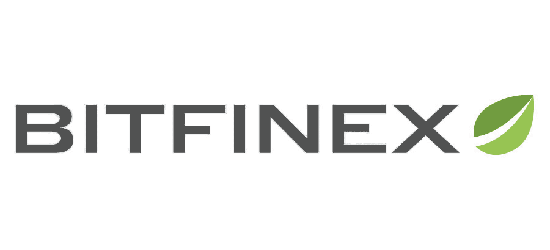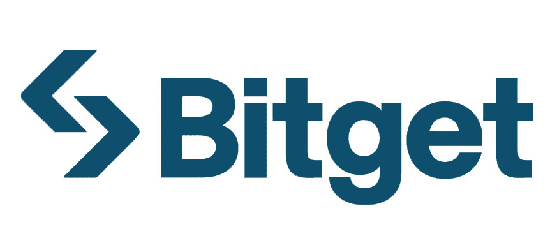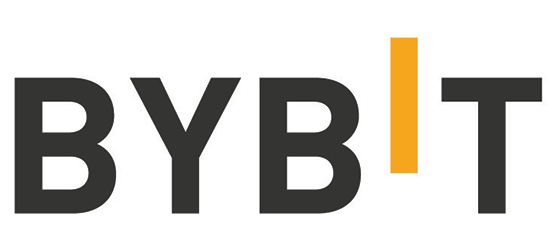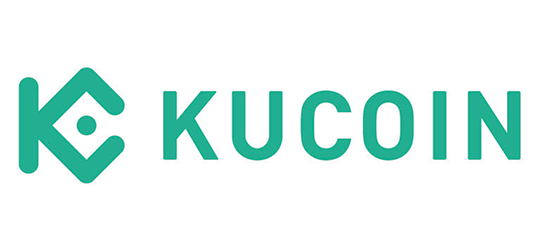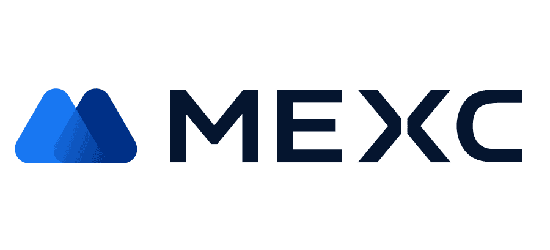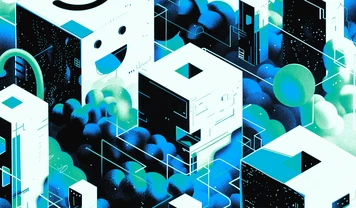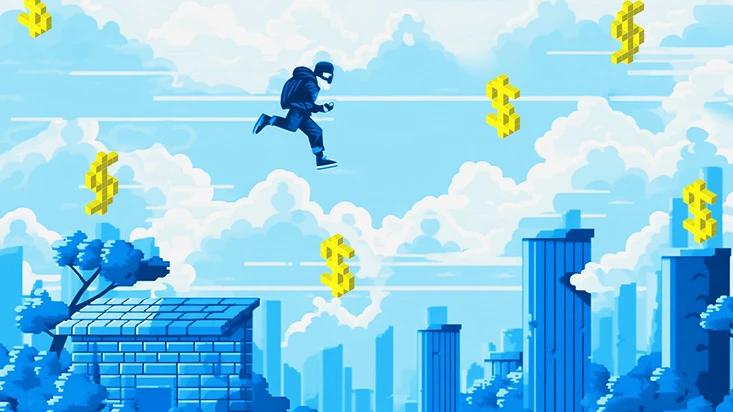
Top 10 Play-to-Earn Crypto Games 2023
Explore the top 10 play-to-earn crypto games reshaping the gaming industry. Dive into blockchain-powered gaming platforms where entertainment meets tangible rewards.
The Evolution of Gaming: From Arcades to Blockchain's Play-to-Earn
The gaming industry, long recognized as one of the predominant pillars of entertainment, has consistently adapted to technological advancements, evolving in both scope and complexity.
The genesis of the modern gaming industry can be traced back to the arcade games of the early 1970s. These video games operated on a pay-per-play basis, where, as the term implies, players were charged for each gaming session. Players would deposit a modest fee to enjoy a few minutes of gameplay.
However, technological innovation transformed this model, facilitating the migration of games from specialized arenas to widespread devices like personal computers, smartphones, and state-of-the-art gaming consoles such as the PS5 and Xbox. This prompted a shift from the pay-per-play model of arcade games to a one-time payment approach. This new method of payment meant that players could simply pay a one-off sum in order to gain total access to a console and game.
By the late 1990s, subscription-based models became prevalent, especially with lMMORPGs online games such as Tibia, Runescape, and World of Warcraft, where players paid regular fees for continuous game access.
Today, we stand on the brink of another significant transformation in the realm of gaming. As the blockchain technology landscape expands, it introduces a novel model of gaming, distinctively termed "play-to-earn" (P2E).
In this model, players earn rewards for their in-game achievements. Such a model saw widespread adoption during the crypto bull market of 2021, with games like Axie Infinity, The Sandbox, and Splinterlands gaining massive traction. P2E not only allows players to monetize their gameplay but also enriches the in-game ecosystem, creating value for both fellow gamers and developers.
In this article, we will delve into the play-to-earn paradigm and highlight our top 10 picks of the most popular play-to-earn crypto games.

Understanding Play-to-Earn Crypto Games
"Play-to-earn" games, as the term suggests, provide players with the opportunity to earn real-world value from their in-game activities. Unlike traditional games where the primary incentive to play is entertainment, these games offer a dual incentive: both entertainment and potential earnings.
Here's a breakdown of the concept:
Core Principle
These games operate on blockchain technology. As players engage with the game, they can accumulate cryptocurrency rewards.
In-game Assets
Players can amass various in-game assets, ranging from skins and cards to specific cryptocurrencies. The more one engages with the game, the richer their asset collection becomes, and potentially, the more valuable these assets are.
Real-World Value
Traditional gaming confines asset value within the game's ecosystem. In stark contrast, assets in play-to-earn games carry tangible real-world worth. This is made possible primarily due to blockchain's decentralized nature, enabling players to freely transact, buy, and sell these assets outside the game. They're often represented as Non-Fungible Tokens (NFTs), which can be traded for cryptocurrency and then exchanged for fiat currency on external platforms.
Monetizing Gameplay
Traditional gaming's relationship with players is mostly transactional—you buy the game or in-game assets, and that's where monetization ends unless you're an esports celebrity or a popular streamer. However, play-to-earn models flip this narrative, allowing even everyday players to monetize their playtime. Thanks to blockchain, value transfer is borderless, giving players globally the chance to earn.
Decentralization
One of the pivotal features of play-to-earn games is decentralization. Unlike traditional games where developers hold the reins of power, here, assets are democratically distributed among players. This fosters a more interactive and equitable in-game economy, where players not only benefit but also contribute value back to the game and their fellow participants.
The meteoric rise of play-to-earn games is attributed to the blend of entertainment and economic opportunity they present. By engaging in tasks, challenges, or competitions within these crypto-powered games, players can earn cryptocurrencies, which can then be translated to real-world earnings.
Play-to-earn Mechanics
Axie Infinity was a pioneer in implementing the P2E model on a significant scale, experiencing considerable success. The mechanism operates as follows:
A gamer acquires an NFT to gain access to the platform, participates in the game, and garners gaming tokens.
These gaming tokens possess convertibility, allowing players to transform them into Bitcoin, Ethereum, fiat currency, or stablecoins.
The initially procured NFTs, essential for gameplay, can be enhanced as players refine their skills. As their value rises, they can be traded on NFT marketplaces at escalated prices.
Looking Deeper: What is GameFi
Play-to-earn is a business model that is a part of a broader concept named GameFi. The term 'GameFi' is a portmanteau of 'game' and 'finance'. First introduced to the world by Andre Cronje, the CEO of Yearn Finance, in a 2020 tweet, GameFi fuses blockchain technology, non-fungible tokens (NFTs), and gaming mechanics. The result is a virtual environment where participants can play and earn tokens simultaneously.
Within GameFi, traditional financial activities like trading, staking, yield farming, and lending are incorporated into gaming. As a result, gamers can earn tangible rewards, typically in the form of cryptocurrencies or blockchain tokens, through their in-game actions. For example, in the GameFi universe, players might secure tokens by accomplishing missions. These tokens can be utilized in-game for purchasing digital assets, staking for additional tokens, or traded on external decentralized exchanges for other crypto or fiat money.
GameFi projects leverage the P2E model to expand their gamer base, consequently bolstering the supply side of tokens. Simultaneously, they cultivate demand for these tokens by introducing "in-game" marketplaces, where in-game assets like weapons, vehicles, and props are sold.
As the supply and demand dynamics of gaming tokens steadily scale, the platform achieves sustainable network effects. This initiates a self-reinforcing, virtuous cycle, marking the emergence of a fully functional GameFi ecosystem.
Top 10 Play-to-earn Games
Now that we have covered the basics, let’s move on to the real deal. Here is our pick of the most popular P2E crypto games in 2023.
#1 – Axie Infinity
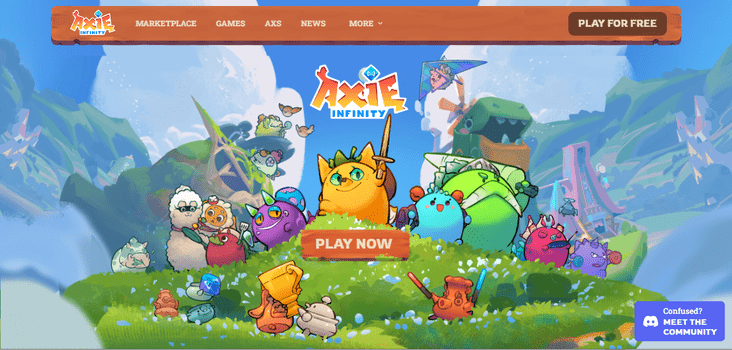
Source and Copyright: © Axie Infinity
Axie Infinity is a blockchain-based game developed by Sky Mavis that gained significant attention as one of the pioneers of the "Play-to-Earn" (P2E) model in the gaming industry.
In Axie Infinity, players collect, breed, raise, battle, and trade fantasy creatures known as "Axies". Axies are digital creatures in the form of NFT somewhat akin to "Pokémon" in terms of battling and collecting. The gameplay of Axie Infinity requires strategic decision-making, as diverse environments necessitate distinct strategies for success.
Players can breed their Axies to produce new ones. This process requires the expenditure of a token called Small Love Potion (SLP). Players can earn SLP tokens by winning battles in the game's adventure modes, these SLP tokens have real-world value and can be traded on various cryptocurrency exchanges. Axies themselves can be sold or bought on the game's marketplace or other NFT platforms.
#2 – The Sandbox
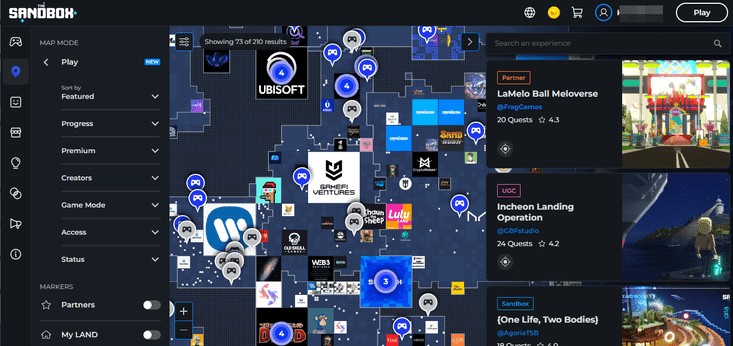
Source and Copyright: © The Sandbox
The Sandbox is a blockchain-based virtual world and game that leverages the concept of user-generated content, combined with the principles of decentralized ownership and monetization.
At the heart of The Sandbox is its virtual land system. The game world is divided into parcels of land, each represented by a unique NFT on the blockchain. Owners of these land parcels can build, populate, and create interactive experiences on their lands.
The platform has its native ERC-20 utility token called $SAND. Players can earn $SAND by participating in various activities, like playing games, completing quests, or through staking.
In addition, Sandbox's has 3D modeling tool named VoxEdit, which allows users to create and animate voxel-based objects. Once created, these assets can be tokenized as NFTs and sold on The Sandbox's marketplace or used within the game world.
#3 – Gods Unchained
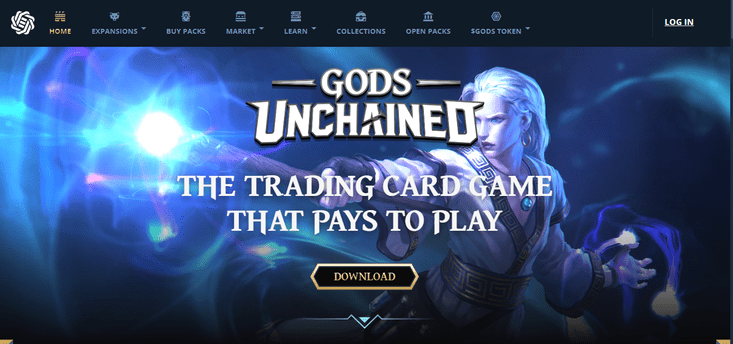 Source and Copyright: © Gods Unchained
Source and Copyright: © Gods Unchained
Gods Unchained is a digital collectible card game (CCG) built on Ethereum. Developed by Immutable, it draws inspiration from traditional card games but introduces blockchain technology to ensure player ownership of the cards.
Players build decks from their collection of cards and face off against other players in strategic battles. Each card has its attributes, abilities, and classifications, and the combination of these cards, along with player strategy, determines the outcome of a match. Cards in the game are tokenized as NFTs. Players can earn card packs by playing the game, and these cards can potentially be sold on various NFT marketplaces.
Like other collectible card games, deck building is an essential aspect of "Gods Unchained". Players must understand the synergy between cards and formulate strategies based on their deck composition and that of their opponent.
#4 – DeFi Kingdoms
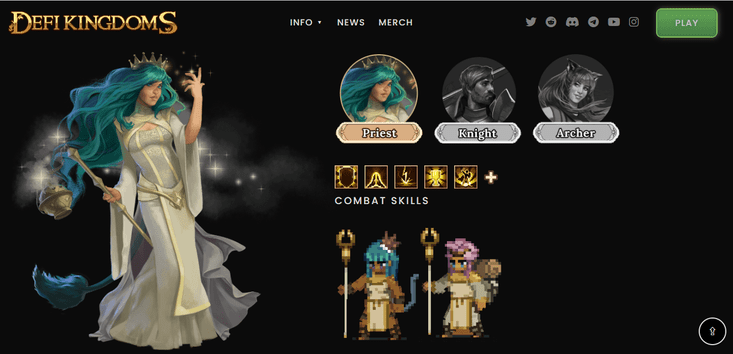
Source and Copyright: © DeFi Kingdoms
DeFi Kingdoms is a role-playing game where players can explore the world, complete quests, and interact with other players. The game is built on Harmony Blokchain and is set in a beautiful pixelated 8-bit world featuring mythical cards, castles and dungeons.
Beyond the RPG elements, "DeFi Kingdoms" integrates a suite of DeFi tools. Players can swap tokens, provide liquidity, and stake their assets to earn rewards, all within the game's interface. JEWEL is the native token of "DeFi Kingdoms".
Players can summon heroes, which are represented as NFTs. Each hero has unique attributes and can be assigned professions like fishing, mining, or foraging. These professions allow heroes to gather resources, which can be used or sold within the game.
JEWEL is the native token of "DeFi Kingdoms." Players can earn JEWEL by participating in the game's DeFi activities, such as providing liquidity or staking. This token can be used in the game or traded on exchanges.
#5 – CryptoKitties
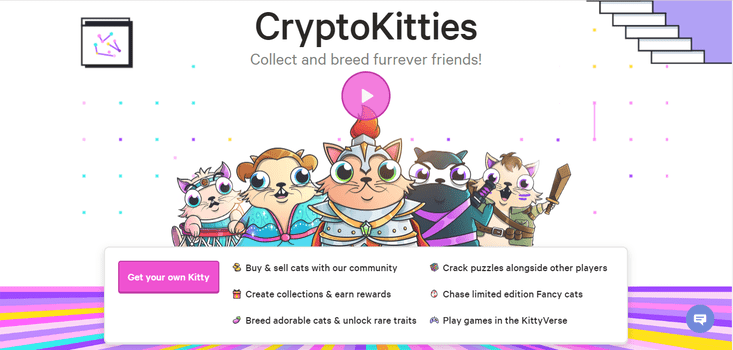
Source and Copyright: © CryptoKitties
CryptoKitties is one of the earliest and most well-known blockchain-based games. It played a significant role in popularizing Non-Fungible Tokens (NFTs) and showcasing their potential within the gaming and collectible sectors.
CryptoKitties is a game where players collect, breed, and trade virtual cats. Each CryptoKitty is unique and is represented by an NFT, which ensures its rarity and authenticity on the Ethereum blockchain.
Players can breed two CryptoKitties to produce a new, unique CryptoKitty. The offspring's appearance and attributes (or "cattributes") result from the combination of its parents' genetic material. This mechanic introduced a depth of strategy as players sought to breed rare and desirable traits.
CryptoKitties can be bought or sold on the game's marketplace. Because each kitty is an NFT, ownership transfers are securely managed on the Ethereum blockchain. The marketplace saw a wide range of prices, with some rare CryptoKitties selling for substantial sums.
#6 – Aavegotchi
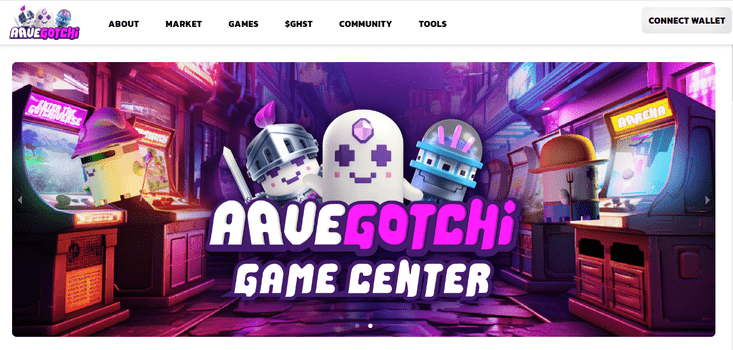
Source and Copyright: © Aavegotchi
Aavegotchi is a unique blockchain-based game that merges elements of decentralized finance (DeFi) with virtual collectibles. The name "Aavegotchi" is a fusion of "Aave" – a well-known DeFi protocol – and "Tamagotchi" – the popular digital pet toy from the 1990s. This game combines aspects of DeFi with the nostalgia and mechanics reminiscent of digital pet-raising.
An Aavegotchi is a tokenized ghost avatar on the blockchain, represented as an NFT. These avatars are distinct, with unique attributes and traits. They can be equipped with wearables and can also interact in the Aavegotchi metaverse. Aavegotchis have various attributes determining their rarity, such as aggression, energy, and intelligence. This rarity system, combined with the wearables (which can also be NFTs), adds layers of strategy and desirability for collectors and players.
Aavegotchis are "staked" with Aave's aTokens, interest-bearing tokens that represent a user's funds supplied to the Aave protocol. This means that each Aavegotchi essentially has a value tied to it based on the underlying aTokens. The more valuable the staked tokens, the stronger the Aavegotchi.
#7 Star Atlas
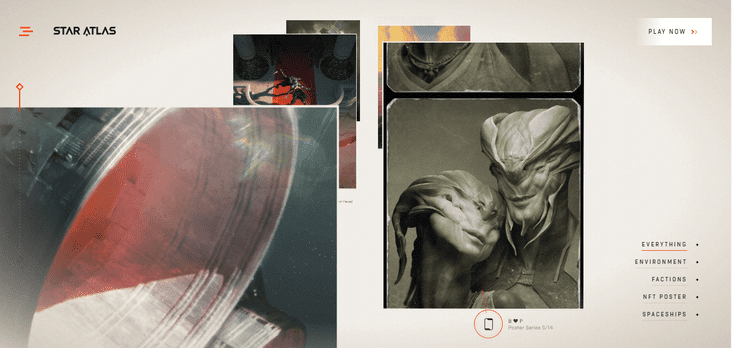
Source and Copyright: © Star Atlas
Star Atlas is a grand strategy game of space exploration, territorial conquest, and political domination, built on the Solana blockchain. It is not only a game but also a virtual metaverse with economic, political, and social dimensions. One of the distinct features of Star Atlas is its commitment to high-quality graphics and immersion. It leverages Unreal Engine 5, aiming to deliver a visually stunning and detailed universe for players to explore.
The game incorporates blockchain mechanics to give players ownership of in-game assets. Ships, crew, equipment, land, and more are tokenized as NFTs. Mining resources, conquering territories, and trading are some of the many ways players can potentially earn.
This game employs a dual token economy utilizing ATLAS and POLIS tokens. ATLAS is the currency used by Star Atlas users to purchase items and earn rewards for reaching milestones. The POLIS token is the governance token of Star Atlas, which enables players to influence the game's future development in a completely decentralized ecosystem.
#8 – Alien Worlds
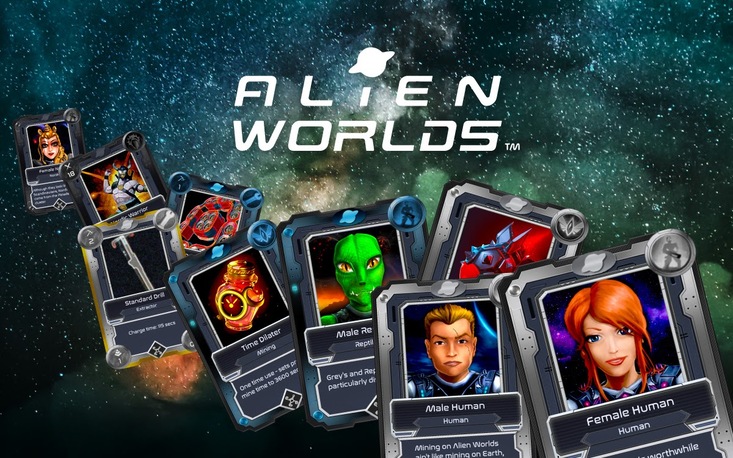
Source and Copyright: © Alien Worlds
Alien Worlds is a blockchain-based metaverse where players can explore, mine, and battle across different planets. At the core of Alien Worlds is the mechanism that allows players, known as "explorers", to mine the in-game token, Trilium (TLM). By staking their tools and selecting a location, players can mine TLM, which has actual value and can be traded on various cryptocurrency exchanges.
Alien Worlds consists of various planets, each governed by its Decentralized Autonomous Organization (DAO). Players can vote on the planetary DAO's policies, such as mining rates or reward distributions, based on their TLM stake.
Players can also engage in battles using their avatars, leveraging their unique strengths and weapons to compete for rewards. Tools, weapons, avatars, and land within the game are tokenized as NFTs.
Initially built on the WAX blockchain, Alien Worlds later integrated with the Binance Smart Chain (BNB) and Ethereum to facilitate broader interoperability and liquidity for its in-game token, TLM.
#9 – Farmers World

Source and Copyright: © Farmers World
Farmers World is a Wax blockchain-based play-to-earn game that combines farming simulation elements with economic incentives derived from the world of DeFi and NFTs.
In Farmers World, players cultivate virtual lands, plant seeds, harvest crops, and raise animals, much like traditional farming simulation games. Essential items within the game, such as tools, land, seeds, and animals, are tokenized as NFTs. These NFTs can be traded, sold, or rented in the game's marketplace or external platforms, allowing players to monetize their efforts.
Players can earn in-game tokens or other rewards by performing various activities, such as planting and harvesting crops or participating in special events. Success in Farmers World often requires careful resource management and strategic decision-making. Players must decide which crops to plant, when to harvest, and how to best utilize their land and tools to maximize their returns.
10# - Illuvium
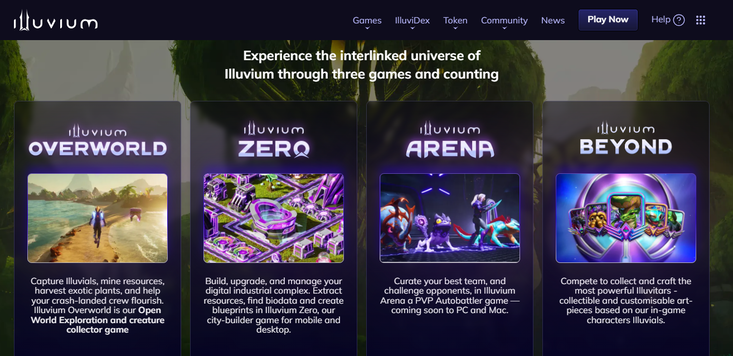
Source and Copyright: © Illuvium
Illuvium is a blockchain-based game built on the Ethereum network that combines elements of role-playing games (RPGs), auto-battlers, and open-world exploration.
Illuvium offers an expansive, open-world environment where players can explore various terrains, encounter creatures, and engage in battles, and earn rewards in the form of ILV the game's native cryptocurrency. Players can stake the game's native token, ILV, to earn rewards and take part in the game’s governance.
The game revolves around capturing creatures called "Illuvials." These creatures, once captured, can be used in team-based battles, reminiscent of games like Pokémon. Battles in Illuvium are designed as auto-battlers. Players set up their team and strategy, and then battles play out automatically based on the chosen tactics.
Unlike many earlier blockchain games, Illuvium emphasizes high-quality graphics and detailed character designs, aiming for a AAA gaming experience.












